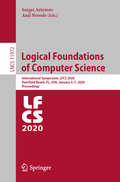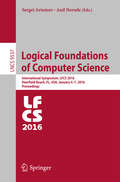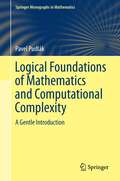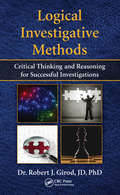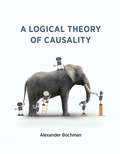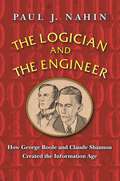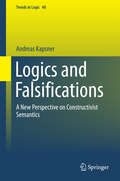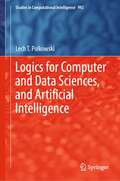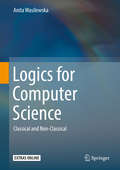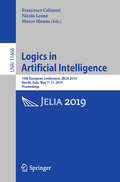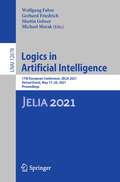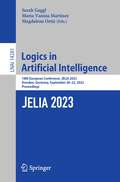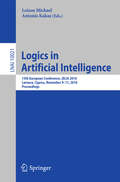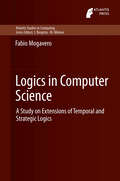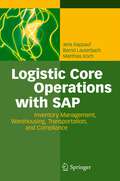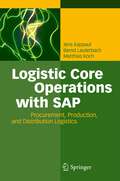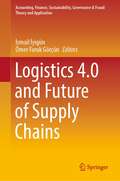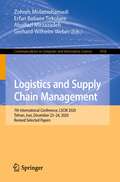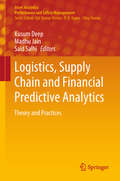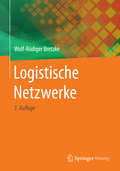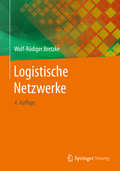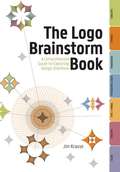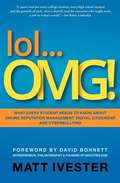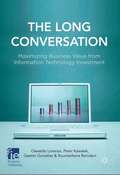- Table View
- List View
Logical Foundations of Computer Science: International Symposium, LFCS 2020, Deerfield Beach, FL, USA, January 4–7, 2020, Proceedings (Lecture Notes in Computer Science #11972)
by Sergei Artemov Anil NerodeThis book constitutes the refereed proceedings of the International Symposium on Logical Foundations of Computer Science, LFCS 2020, held in Deerfield Beach, FL, USA, in January 2020. The 17 revised full papers were carefully reviewed and selected from 30 submissions. The scope of the Symposium is broad and includes constructive mathematics and type theory; homotopy type theory; logic, automata, and automatic structures; computability and randomness; logical foundations of programming; logical aspects of computational complexity; parameterized complexity; logic programming and constraints; automated deduction and interactive theorem proving; logical methods in protocol and program verification; logical methods in program specification and extraction; domain theory logics; logical foundations of database theory; equational logic and term rewriting; lambda and combinatory calculi; categorical logic and topological semantics; linear logic; epistemic and temporal logics; intelligent and multiple-agent system logics; logics of proof and justification; non-monotonic reasoning; logic in game theory and social software; logic of hybrid systems; distributed system logics; mathematical fuzzy logic; system design logics; other logics in computer science.
Logical Foundations of Computer Science
by Anil Nerode Sergei ArtemovThis bookconstitutes the refereed proceedings of the International Symposium on LogicalFoundations of Computer Science, LFCS 2016, held in Deerfield Beach, FL, USA inJanuary 2016. The 27 revised full paperswere carefully reviewed and selected from 46 submissions. The scopeof the Symposium is broad and includes constructive mathematics and typetheory; homotopy type theory; logic, automata, and automatic structures;computability and randomness; logical foundations of programming; logicalaspects of computational complexity; parameterized complexity; logicprogramming and constraints; automated deduction and interactive theoremproving; logical methods in protocol and program verification; logical methodsin program specification and extraction; domain theory logics; logicalfoundations of database theory; equational logic and term rewriting; lambda andcombinatory calculi; categorical logic and topological semantics; linear logic;epistemic and temporal logics; intelligent and multiple-agent system logics;logics of proof and justification; non-monotonic reasoning; logic in gametheory and social software; logic of hybrid systems; distributed system logics;mathematical fuzzy logic; system design logics; and other logics in computerscience.
Logical Foundations of Mathematics and Computational Complexity
by Pavel PudlákThe two main themes of this book, logic and complexity, are both essential for understanding the main problems about the foundations of mathematics. Logical Foundations of Mathematics and Computational Complexity covers a broad spectrum of results in logic and set theory that are relevant to the foundations, as well as the results in computational complexity and the interdisciplinary area of proof complexity. The author presents his ideas on how these areas are connected, what are the most fundamental problems and how they should be approached. In particular, he argues that complexity is as important for foundations as are the more traditional concepts of computability and provability. Emphasis is on explaining the essence of concepts and the ideas of proofs, rather than presenting precise formal statements and full proofs. Each section starts with concepts and results easily explained, and gradually proceeds to more difficult ones. The notes after each section present some formal definitions, theorems and proofs. Logical Foundations of Mathematics and Computational Complexity is aimed at graduate students of all fields of mathematics who are interested in logic, complexity and foundations. It will also be of interest for both physicists and philosophers who are curious to learn the basics of logic and complexity theory.
Logical Investigative Methods: Critical Thinking and Reasoning for Successful Investigations
by Robert J. GirodThis book describes how to use logic, reasoning, critical thinking, and the scientific method to conduct and improve criminal and civil investigations. The author discusses how investigators and attorneys can avoid assumptions and false premises and instead make valid deductions, inductions, and inferences. He explains how tools such as interview and interrogation can be used to detect deception and profile unknown individuals and suspects. The book is aimed at improving not only the conduct of investigations, but also the logical use of cognitive, analytical, documentation, and presentation tools to win cases.
A Logical Theory of Causality
by Alexander BochmanA general formal theory of causal reasoning as a logical study of causal models, reasoning, and inference.In this book, Alexander Bochman presents a general formal theory of causal reasoning as a logical study of causal models, reasoning, and inference, basing it on a supposition that causal reasoning is not a competitor of logical reasoning but its complement for situations lacking logically sufficient data or knowledge. Bochman also explores the relationship of this theory with the popular structural equation approach to causality proposed by Judea Pearl and explores several applications ranging from artificial intelligence to legal theory, including abduction, counterfactuals, actual and proximate causality, dynamic causal models, and reasoning about action and change in artificial intelligence. As logical preparation, before introducing causal concepts, Bochman describes an alternative, situation-based semantics for classical logic that provides a better understanding of what can be captured by purely logical means. He then presents another prerequisite, outlining those parts of a general theory of nonmonotonic reasoning that are relevant to his own theory. These two components provide a logical background for the main, two-tier formalism of the causal calculus that serves as the formal basis of his theory. He presents the main causal formalism of the book as a natural generalization of classical logic that allows for causal reasoning. This provides a formal background for subsequent chapters. Finally, Bochman presents a generalization of causal reasoning to dynamic domains.
The Logician and the Engineer: How George Boole and Claude Shannon Created the Information Age
by Paul J. NahinHow two pioneers of math and technology ushered in the computer revolutionBoolean algebra, also called Boolean logic, is at the heart of the electronic circuitry in everything we use—from our computers and cars, to home appliances. How did a system of mathematics established in the Victorian era become the basis for such incredible technological achievements a century later? In The Logician and the Engineer, Paul Nahin combines engaging problems and a colorful historical narrative to tell the remarkable story of how two men in different eras—mathematician and philosopher George Boole and electrical engineer and pioneering information theorist Claude Shannon—advanced Boolean logic and became founding fathers of the electronic communications age. Nahin takes readers from fundamental concepts to a deeper and more sophisticated understanding of modern digital machines, in order to explore computing and its possible limitations in the twenty-first century and beyond.
Logiciel de Rootage pour Kindle, Application, Outil: guide d’astuces pour une utilisation optimale de Kindle Fire
by Larry AlisonUn guide étape par étape sur la façon de rooter des appareils Kindle Sinon, la meilleure caractéristique des appareils Kindle est la possibilité de les rooter. Cela vous permettra d'accéder à tout contenu de votre choix, comme des émissions de télévision, des applications, de la musique et des films. Voici ce que vous obtiendrez: -Fonctionne pour tout appareil Kindle -À propos de l'enracinement -Comment rooter votre Kindle -Résolution des problèmes -Comment ajouter Google Play -Profitez de l'accès aux applications, films, musique et émissions de télévision
Logics and Falsifications
by Andreas KapsnerThis volume examines the concept of falsification as a central notion of semantic theories and its effects on logical laws. The point of departure is the general constructivist line of argument that Michael Dummett has offered over the last decades. From there, the author examines the ways in which falsifications can enter into a constructivist semantics, displays the full spectrum of options, and discusses the logical systems most suitable to each one of them. While the idea of introducing falsifications into the semantic account is Dummett's own, the many ways in which falsificationism departs quite radically from verificationism are here spelled out in detail for the first time. The volume is divided into three large parts. The first part provides important background information about Dummett's program, intuitionism and logics with gaps and gluts. The second part is devoted to the introduction of falsifications into the constructive account and shows that there is more than one way in which one can do this. The third part details the logical effects of these various moves. In the end, the book shows that the constructive path may branch in different directions: towards intuitionistic logic, dual intuitionistic logic and several variations of Nelson logics. The author argues that, on balance, the latter are the more promising routes to take. "Kapsner's book is the first detailed investigation of how to incorporate the notion of falsification into formal logic. This is a fascinating logico-philosophical investigation, which will interest non-classical logicians of all stripes. " Graham Priest, Graduate Center, City University of New York and University of Melbourne
Logics for Computer and Data Sciences, and Artificial Intelligence (Studies in Computational Intelligence #992)
by Lech T. PolkowskiThis volume offers the reader a systematic and throughout account of branches of logic instrumental for computer science, data science and artificial intelligence. Addressed in it are propositional, predicate, modal, epistemic, dynamic, temporal logics as well as applicable in data science many-valued logics and logics of concepts (rough logics). It offers a look into second-order logics and approximate logics of parts.The book concludes with appendices on set theory, algebraic structures, computability, complexity, MV-algebras and transition systems, automata and formal grammars.By this composition of the text, the reader obtains a self-contained exposition that can serve as the textbook on logics and relevant disciplines as well as a reference text.
Logics for Computer Science: Classical And Non-classical
by Anita WasilewskaProviding an in-depth introduction to fundamental classical and non-classical logics, this textbook offers a comprehensive survey of logics for computer scientists. Logics for Computer Science contains intuitive introductory chapters explaining the need for logical investigations, motivations for different types of logics and some of their history. They are followed by strict formal approach chapters. All chapters contain many detailed examples explaining each of the introduced notions and definitions, well chosen sets of exercises with carefully written solutions, and sets of homework. While many logic books are available, they were written by logicians for logicians, not for computer scientists. They usually choose one particular way of presenting the material and use a specialized language. Logics for Computer Science discusses Gentzen as well as Hilbert formalizations, first order theories, the Hilbert Program, Godel's first and second incompleteness theorems and their proofs. It also introduces and discusses some many valued logics, modal logics and introduces algebraic models for classical, intuitionistic, and modal S4 and S5 logics.The theory of computation is based on concepts defined by logicians and mathematicians. Logic plays a fundamental role in computer science, and this book explains the basic theorems, as well as different techniques of proving them in classical and some non-classical logics. Important applications derived from concepts of logic for computer technology include Artificial Intelligence and Software Engineering. In addition to Computer Science, this book may also find an audience in mathematics and philosophy courses, and some of the chapters are also useful for a course in Artificial Intelligence.
Logics in Artificial Intelligence: 16th European Conference, JELIA 2019, Rende, Italy, May 7–11, 2019, Proceedings (Lecture Notes in Computer Science #11468)
by Francesco Calimeri Nicola Leone Marco MannaThis book constitutes the proceedings of the 16th European Conference on Logics in Artificial Intelligence, JELIA 2019, held in Rende, Italy, in May 2019. The 50 full papers and 10 short papers included in this volume were carefully reviewed and selected from 101 submissions. Additionally, the book contains 3 invited papers. The accepted papers span a number of areas within Logics in AI, including: belief revision and argumentation; causal, defeasible and inductive reasoning; conditional, probabilistic and propositional logic; description logics; logic programming; modal and default logic; and temporal logic.
Logics in Artificial Intelligence: 17th European Conference, JELIA 2021, Virtual Event, May 17–20, 2021, Proceedings (Lecture Notes in Computer Science #12678)
by Wolfgang Faber Gerhard Friedrich Martin Gebser Michael MorakThis book constitutes the proceedings of the 17th European Conference on Logics in Artificial Intelligence, JELIA 2021, held as a virtual event, in May 2021. The 27 full papers and 3 short papers included in this volume were carefully reviewed and selected from 68 submissions. The accepted papers span a number of areas within Logics in AI, including: argumentation; belief revision; reasoning about actions, causality, and change; constraint satisfaction; description logics and ontological reasoning; non-classical logics; and logic programming (answer set programming).
Logics in Artificial Intelligence: 18th European Conference, JELIA 2023, Dresden, Germany, September 20–22, 2023, Proceedings (Lecture Notes in Computer Science #14281)
by Sarah Gaggl Maria Vanina Martinez Magdalena OrtizThis book constitutes proceedings of the 18th European Conference on Logics in Artificial Intelligence, JELIA 2023, held in Dresden, Germany, in September 2023.The 41 full papers and 11 short papers included in this volume were carefully reviewed and selected from 111 submissions. The accepted papers span a number of areas within Logics in AI, including: argumentation; belief revision; reasoning about actions, causality, and change; constraint satisfaction; description logics and ontological reasoning; non-classical logics; and logic programming (answer set programming).
Logics in Artificial Intelligence
by Loizos Michael Antonis KakasThis book constitutes the proceedings of the 15th European Conference on Logics in Artificial Intelligence, JELIA 2016, held in Larnaca, Cyprus, in November 2015. The 32 full papers and 10 short papers included in this volume were carefully reviewed and selected from 88 submissions. The accepted papers span a number of areas within Logics in AI, including: belief revision, answer set programming, argumentation, probabilistic reasoning, handling inconsistencies, temporal logics and planning, description logics, and decidability and complexity results.
Logics in Computer Science: A Study on Extensions of Temporal and Strategic Logics
by Fabio MogaveroIn this monograph we introduce and examine four new temporal logic formalisms that can be used as specification languages for the automated verification of the reliability of hardware and software designs with respect to a desired behavior. The work is organized in two parts. In the first part two logics for computations, the graded computation tree logic and the computation tree logic with minimal model quantifiers are discussed. These have proved to be useful in describing correct executions of monolithic closed systems. The second part focuses on logics for strategies, strategy logic and memoryful alternating-time temporal logic, which have been successfully applied to formalize several properties of interactive plays in multi-entities systems modeled as multi-agent games.
Logistic Core Operations with SAP: Inventory Management, Warehousing, Transportation, and Compliance
by Bernd Lauterbach Jens Kappauf Matthias Koch"Logistic Core Operations with SAP" not only provides an overview of core logistics processes and functionality--it also shows how SAP's Business Suite covers logistic core operations, what features are supported, and which systems can be used to implement end-to-end processes in the following logistic core disciplines: Procurement, Distribution, Transportation, Warehouse Logistics and Inventory Management, and Compliance and Reporting. In this context the authors not only explain their integration, the organizational set-up, and master data, but also which solution fits best for a particular business need. This book serves as a solid foundation for understanding SAP software. No matter whether you are a student or a manager involved in an SAP implementation, the authors go far beyond traditional function and feature descriptions, helping you ask the right questions, providing answers, and making recommendations. The book assists you in understanding SAP terminology, concepts and technological components as well as their closed-loop integration. Written in a clear, straight-forward style and using practical examples, it contains valuable tips, illustrative screenshots and flowcharts, as well as best practices--showing how business requirements are mapped into software functionality.
Logistic Core Operations with SAP: Procurement, Production and Distribution Logistics
by Bernd Lauterbach Jens Kappauf Matthias Koch"Logistic Core Operations with SAP" not only provides an overview of core logistics processes and functionality--it also shows how SAP's Business Suite covers logistic core operations, what features are supported, and which systems can be used to implement end-to-end processes in the following logistic core disciplines: Procurement, Distribution, Transportation, Warehouse Logistics and Inventory Management, and Compliance and Reporting. In this context the authors not only explain their integration, the organizational set-up, and master data, but also which solution fits best for a particular business need. This book serves as a solid foundation for understanding SAP software. No matter whether you are a student or a manager involved in an SAP implementation, the authors go far beyond traditional function and feature descriptions, helping you ask the right questions, providing answers, and making recommendations. The book assists you in understanding SAP terminology, concepts and technological components as well as their closed-loop integration. Written in a clear, straight-forward style and using practical examples, it contains valuable tips, illustrative screenshots and flowcharts, as well as best practices--showing how business requirements are mapped into software functionality.
Logistics 4.0 and Future of Supply Chains (Accounting, Finance, Sustainability, Governance & Fraud: Theory and Application)
by İsmail İyigün Ömer Faruk GörçünThis book provides a detailed theoretical background of Logistics 4.0 using real-world examples and case studies and proposes a methodological framework to understand the technological revolutions happening in the present day from the perspective of logistics management. With the fourth industrial revolution, new technologies, such as artificial intelligence, cloud computing, 3D printers and the Internet of Things started to take greater prominence in the world of business. One of the sectors most affected by changes brought on by this Industry 4.0 is logistics, which has given rise to the concept of Logistics 4.0. Covering a wide range of topics on Logistics 4.0, such as warehousing, big data, 3D printing, robotics and cloud computing, this book would be a valuable read for those involved in logistics management, academics and students in the areas of supply chain management, logistics, industry 4, and big data. .
Logistics and Supply Chain Management: 7th International Conference, LSCM 2020, Tehran, Iran, December 23-24, 2020, Revised Selected Papers (Communications in Computer and Information Science #1458)
by Zohreh Molamohamadi Erfan Babaee Tirkolaee Abolfazl Mirzazadeh Gerhard-Wilhelm WeberThis book constitutes selected and revised papers from the 7th International Conference Logistics and Supply Chain Management, held in December 2020 in Tehran, Iran. Due to the COVID-19 pandemic the conference was held online. The 17 full papers and 2 short papers pressented were thoroughly reviewed and selected out of 70 submissions. The papers are organized in the topical sections on information technology in supply chain management; production/scheduling and transportation in supply chain management; sustainable and resilient supply chain management; humanitarian supply chain management.
Logistics, Supply Chain and Financial Predictive Analytics: Theory And Practices (Asset Analytics)
by Kusum Deep Madhu Jain Said SalhiThis book addresses a broad range of problems commonly encountered in the fields of financial analysis, logistics and supply chain management, such as the use of big data analytics in the banking sector. Divided into twenty chapters, some of the contemporary topics discussed in the book are co-operative/non-cooperative supply chain models for imperfect quality items with trade-credit financing; a non-dominated sorting water cycle algorithm for the cardinality constrained portfolio problem; and determining initial, basic and feasible solutions for transportation problems by means of the “supply demand reparation method” and “continuous allocation method.” In addition, the book delves into a comparison study on exponential smoothing and the Arima model for fuel prices; optimal policy for Weibull distributed deteriorating items varying with ramp type demand rate and shortages; an inventory model with shortages and deterioration for three different demand rates; outlier labeling methods for medical data; a garbage disposal plant as a validated model of a fault-tolerant system; and the design of a “least cost ration formulation application for cattle”; a preservation technology model for deteriorating items with advertisement dependent demand and trade credit; a time series model for stock price forecasting in India; and asset pricing using capital market curves. The book offers a valuable asset for all researchers and industry practitioners working in these areas, giving them a feel for the latest developments and encouraging them to pursue further research in this direction.
Logistische Netzwerke
by Wolf-Rüdiger BretzkeDer Autor stellt industriespezifische und branchenübergreifende logistische Designprinzipien für erfolgreiche Netzmodelle in den Bereichen Industrie, Handel und Transportdienstleistung vor. Für die 2. Auflage wurde u. a. die Analyse zum Thema Nachhaltigkeit vertieft, der Autor hat außerdem mit zusätzlichen Fallbeispielen und Schaubildern die Verständlichkeit verbessert und widmet den methodologischen Grundlagen jetzt ein eigenes Kapitel. Dadurch werden Wissenschaft und Praxis noch stärker miteinander verzahnt.
Logistische Netzwerke
by Wolf-Rüdiger BretzkeDie 4. Auflage dieses erfolgreichen Buches wurde vollständig neu bearbeitet. Themen wie Netzwerkmanagement und -konfiguration, Servicedesign, Multi-Channel-Logistik und Outsourcing werden behandelt. Besonders erwähnenswert sind die ausführliche Erörterung des grundlegenden Themas „Komplexität“ und die Neueinführung des Kapitels „Citylogistik“. Insgesamt trägt das Buch der Tatsache Rechnung, dass sich logistische Konzepte jedweder Art mehr denn je in einem komplexen und hochdynamischen Umfeld bewähren müssen. Das Verständnis dieses Umfelds und die Umsetzung der Konzepte und Ideen im Unternehmen, werden dem Leser durch vielfältige Praxisbeispiele erleichtert.
The Logo Brainstorm Book: A Comprehensive Guide for Exploring Design Directions
by Jim KrauseDon't Wait for Inspiration to StrikeWhether you're facing a new logo project or you've reached a block in your current work, The Logo Brainstorm Book will inspire you to consider fresh creative approaches that will spark appealing, functional and enduring design solutions.Award-winning designer Jim Krause (author of the popular Index series) offers a smart, systemic exploration of different kinds of logos and logo elements, including:SymbolsMonogramsTypographic LogosType and Symbol CombinationsEmblemsColor Palettes Through a combination of original, visual idea-starters and boundary-pushing exercises, The Logo Brainstorm Book will help you develop raw logo concepts into presentation-ready material.
lol... Omg! What Every Student Needs to Know about Online Reputation Management, Digital Citizenship and Cyberbullying
by Matt IvesterThe ease with which digital content can be shared online, in addition to its many benefits, has created a host of problems for today's high school and college students. All too often, students are uploading, updating, posting and publishing without giving a second thought to who might see their content or how it might be perceived. lol. . . OMG! provides a cautionary look at the many ways that today's students are experiencing the unanticipated negative consequences of their digital decisions - from lost job opportunities and denied college and graduate school admissions to full-blown national scandals. It also examines how technology is allowing students to bully one another in new and disturbing ways, and why students are often crueler online than in person. By using real-life case studies and offering actionable strategies and best practices, this book empowers students to clean up and maintain a positive online presence, and to become responsible digital citizens.
The Long Conversation
by Oswaldo LorenzoFor many years companies have been investing in enterprise systems and IT initiatives butthey are now struggling to achieve the desired results. It takes a long time to make the best of your enterprise systems so businesses must stop looking for the next technology 'silver bullet' and instead maximize the value of existing IT investments. "
